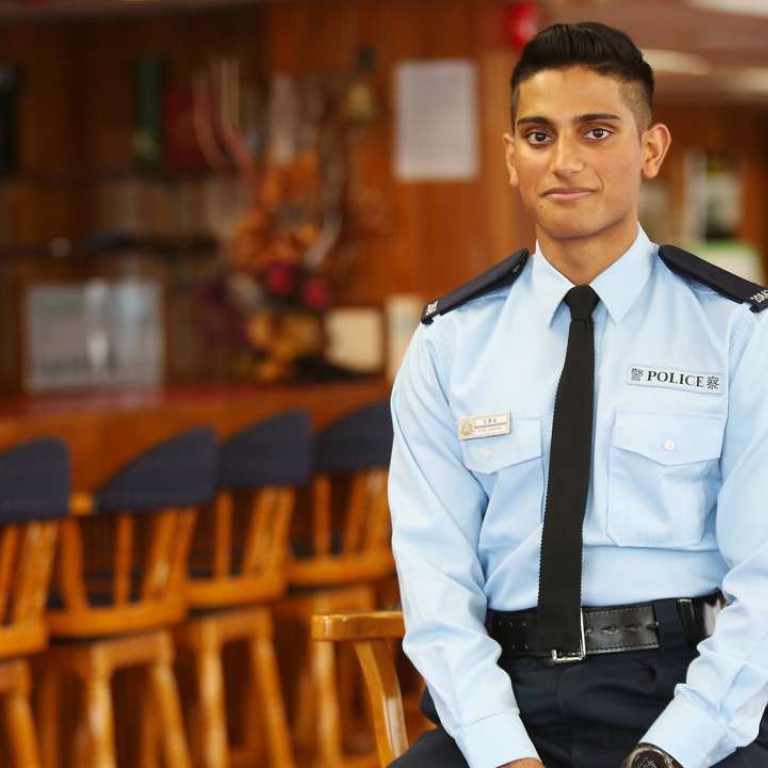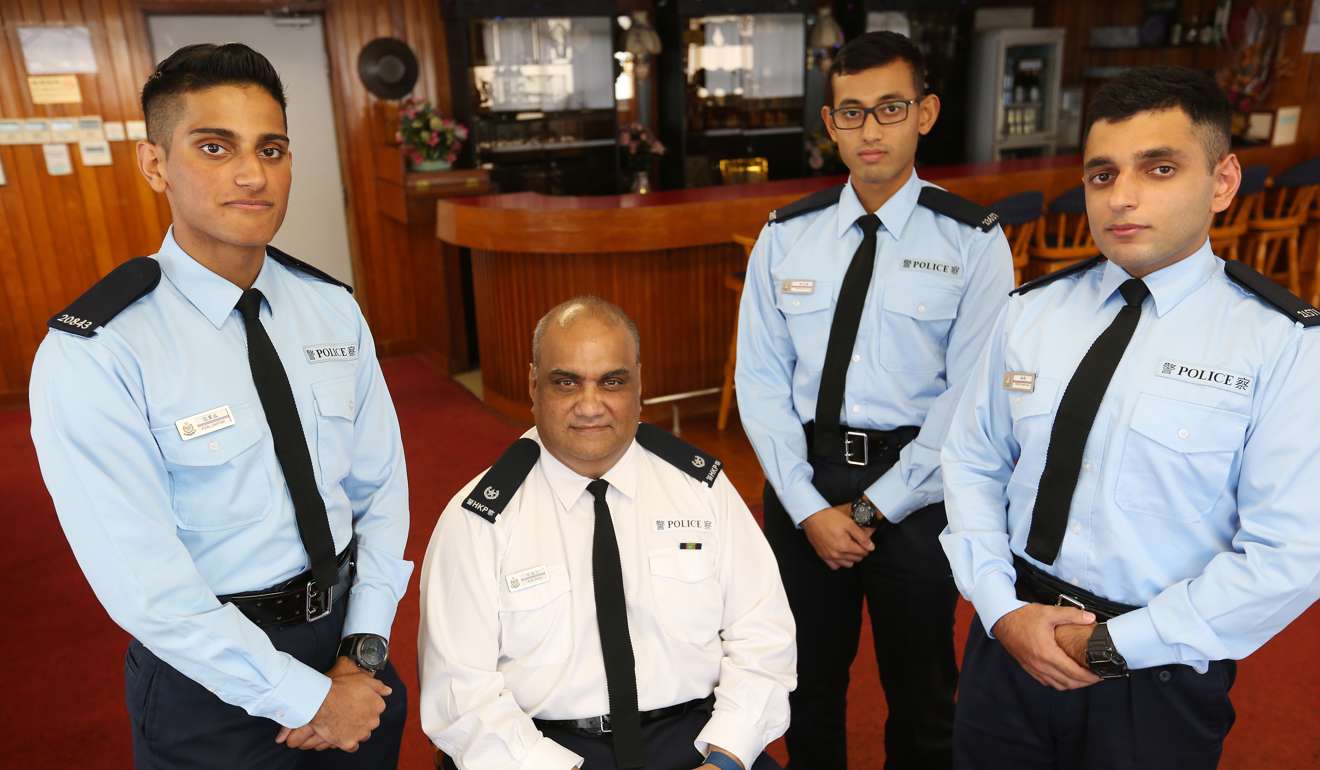
Heroic constable Ifzal Zaffar discusses fame, legacy ... and what it means to be a Hongkonger
After gaining fame for talking a man out of suicide, policeman Ifzal Zaffar hopes other youngsters from ethnic minorities will be inspired to follow in his footsteps
Ifzal Zaffar, a police constable of Pakistani descent, became an overnight hero and viral sensation after he climbed up a crane at a construction site and talked a fellow countryman out of committing suicide in his native Urdu. But he says he was surprised by the unexpected attention.
“I am overwhelmed ... I thought the news would have died down very quickly in the city,” Zaffar said. “It is a bit too much for me actually.”
Speaking to City Weekend almost a month after becoming a household name, the 20-year-old blushed when asked about the unexpected fame and how it changed his life.
Branded as “hero” and “Hong Kong’s most handsome boy cop” on social media, Zaffar said he was stopped by passers-by on the streets and asked to pose for selfies. Many have added him on Facebook and sent him encouraging messages.
Watch: Hong Kong's 'hero' policeman encourages ethnic minorities to join civil service
Zaffar, one of nine students of Project Gemstone, joined the force in April last year. He is now attached to the Yau Ma Tei patrol unit and speaks fluent Cantonese, Putonghua, Urdu and Punjabi, as well as English.

I am overwhelmed and honestly didn’t expect the media exposure would spread so far across the globe. I thought the news would have died down very quickly in the city. The intense international attention on me was totally beyond my expectation. The fame can help me further promote a positive image for the force and engage the ethnic groups in our community. I can now confidently tell them that not only local people can become police officers – Southeast Asians and people of different nationalities can do too. By using my story as an inspiration, I will continue to promote the force and engage more people to join Project Gemstone. Many people, boys and girls, young and old, added me on Facebook since I became famous and asked me how to join the force. Some wrote me encouraging messages to show their support.
Does the overwhelming public attention disturb your daily routine or does it make your work and life more interesting? Do you enjoy being in the spotlight?
The response from the non-ethnic Chinese community is enormous. Many people stopped me on the streets and asked “Oh, are you that guy on the news?” I often thanked them and said “Yes, it’s me”. Some even asked for a picture to be taken with me. I had to turn down their requests if I was on duty at the time.
The funny thing is most people do not recognise me when I am off duty and not in uniform. The media exposure is a bit too much for me, but I think there are positive and negative sides of being famous. I can now help promote a positive image for ethnic minorities in Hong Kong. But sometimes I am afraid that people might recognise me on the streets and I don’t really want the focus to be just on me. I know my colleagues are not jealous of me because we are equals once we put on our uniforms.
What kind of message would you like to send to your supporters and counterparts?
I want to say thank you to all my supporters. I was just doing my job to save someone’s life. I will continue to do the best I can to serve society and Hong Kong citizens. I also want to tell the ethnic minorities in Hong Kong that there are many different opportunities waiting for them. And as long as they are willing to work hard to learn Chinese and be able to achieve a certain level of language proficiency, there is a wide range of career opportunities for them. And of course the police force offers many opportunities too. I am a good example to show them that I have gone through the process and here I am. They can either follow in my footsteps or take up other government jobs.
Why did you want to become a policeman and what difficulties did you encounter on the road to your dream job?
When I was a kid, I thought to myself since most Hong Kong police officers were local Chinese, how could we as ethnic minorities communicate with them and get help if things happened in our community, because many of us couldn’t speak the local language. That really motivated me and drove me to become a policeman. But when I told my parents about my ambition, they doubted if I could succeed as they thought the force would prefer to recruit locals and I wouldn’t have a chance. But now my parents are very proud of me. They keep every newspaper clipping about me and laminate all of them. On the road to my dream job, I have to say confidence was a big problem; initially I lacked confidence in my Chinese language proficiency. I was quite worried about not being able to reach the minimum language requirement.
As a member of the local ethnic minority community, what problems did you see when growing up?
Chinese language was a problem for sure. I went to local schools and attended a few hours of Chinese lessons everyday. But I had no opportunity or incentive to speak in Chinese when I was home or in my spare time. My parents cannot speak or write Chinese, so they cannot help me practise and improve my Chinese. Back then, there weren’t many projects or organisations around to help ethnic minorities acquire an acceptable level of Cantonese proficiency.
What do you do as a bridge between local police and the ethnic minorities?
Police officers in Yau Ma Tei have more direct contact with the ethnic minorities there because that district has a greater concentration of minority groups . But most of the non-ethnic Chinese residents only speak Urdu or Punjabi when they report a crime, which often poses a huge communication problem for my local colleagues. And since many cases are often quite urgent that need immediate action, very often I am the one they call upon to help out. I do the same at crime scenes to help take down eyewitnesses’ accounts when ethnic minorities are involved.
If you are asked to teach the locals one sentence or a phrase in Urdu, what would it be and why?
It would be the word “Hello” in Urdu – kia hall hay. In our culture, it’s the first thing we say to someone when we approach them. When we say these words, it’s guaranteed to put a smile on someone’s face and it helps to gain their trust.
Many people from ethnic minorities seem to have lost hope and given up on Hong Kong. What do you want to tell them?
Ultimately, I want to join the emergency unit and the police tactical unit. These two are operational sections that handle emergency situations and I think I can definitely offer more direct help to my community in those capacities . To my fellow countrymen, I will offer this advice; our young people must seize every opportunity available.
There are many organisations that offer projects and courses to help us learn the local language so young people must take advantage of these programmes. Hong Kong is our home, so learning English is not enough, especially if you want to build a career here. You must learn the local language.
COLOUR NEUTRAL AND A STRONG SENSE OF BELONGING
What are the most important qualities you see in a person?
One should be kindhearted and not mind an individual’s skin colour. A person should devote himself or herself to help people without asking for any reward. Having a kind heart is important.
Who is your hero?
My hero is my father. He came to Hong Kong to work when he was very small. He then transferred money home to support his family as my family was poor back then. Without him, we would not be what we are now. My mentor – ethnic Pakistani Superintendent Mohammad Khan – is also my hero. He inspired me a lot and helped me on the road to becoming a policeman.
What were you like as a child? I was never an outgoing kid. I was more like the shy kid who did not talk a lot.
Do you daydream?
I do not daydream a lot. But when I do, it is mostly related to my job. I just daydream about patrolling on the streets and helping other people.
What made you proud to be a Hongkonger and do you have any sense of belonging to the city you call home?
I am really proud to be a Hongkonger because of the loving people here in the city and also because the police force gives us an opportunity to serve the community. I totally feel like I belong to Hong Kong.

